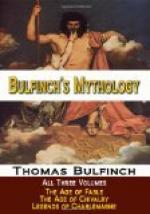Dardanus, progenitor of the Trojan kings
Dardinel, prince of Zumara
Dawn, See Aurora
Day, an attendant on Phoebus, the Sun
Day star (Hesperus)
Death, See Hela
Deiphobus, son of Priam and Hecuba, the bravest brother of Paris
Dejanira, wife of Hercules
Delos, floating island, birthplace of Apollo and Diana
Delphi, shrine of Apollo, famed for its oracles
Demeter, Greek goddess of marriage and human fertility, identified by Romans with Ceres
Demeha, South Wales
Demodocus, bard of Alomous, king of the Phaeaeians
Deucalion, king of Thessaly, who with his wife Pyrrha were the only pair surviving a deluge sent by Zeus
Dia, island of
Diana (Artemis), goddess of the moon and of the chase,
daughter of
Jupiter and Latona
Diana of the Hind, antique sculpture in the Louvre, Paris
Diana, temple of
Dictys, a sailor
Didier, king of the Lombards
Dido, queen of Tyre and Carthage, entertained the
shipwrecked
Aeneas
Diomede, Greek hero during Trojan War
Dione, female Titan, mother of Zeus, of Aphrodite (Venus)
Dionysus See Bacchus
Dioscuri, the Twins (See Castor and Pollux)
Dirce, wife of Lycus, king of Thebes, who ordered Amphion and Zethus to tie Antiope to a wild bull, but they, learning Antiope to be their mother, so treated Dirce herself
Dis See Pluto
Discord, apple of, See Eris.
Discordia, See Eris.
Dodona, site of an oracle of Zeus (Jupiter)
Dorceus, a dog of Diana
Doris, wife of Nereus
Dragon’s teeth sown by Cadmus
Druids, ancient Celtic priests
Dryades (or Dryads), See Wood nymphs
Dryope, changed to a lotus plant, for plucking a lotus—enchanted form of the nymph Lotis
Dubricius, bishop of Caerleon,
Dudon, a knight, comrade of Astolpho,
Dunwallo Molmu’tius, British king and lawgiver
Durindana, sword of Orlando or Rinaldo
Dwarfs in Wagner’s Nibelungen Ring
E
Earth (Gaea); goddess of the
Ebudians, the
Echo, nymph of Diana, shunned by Narcissus, faded to nothing but a voice
Ecklenlied, the
Eddas, Norse mythological records,
Ederyn, son of Nudd
Egena, nymph of the Fountain
Eisteddfod, session of Welsh bards and minstrels
Electra, the lost one of the Pleiades, also, sister of Orestes
Eleusian Mysteries, instituted by Ceres, and calculated to awaken feelings of piety and a cheerful hope of better life in the future
Eleusis, Grecian city
Elgin Marbles, Greek sculptures from the Parthenon of Athens, now in British Museum, London, placed there by Lord Elgin




